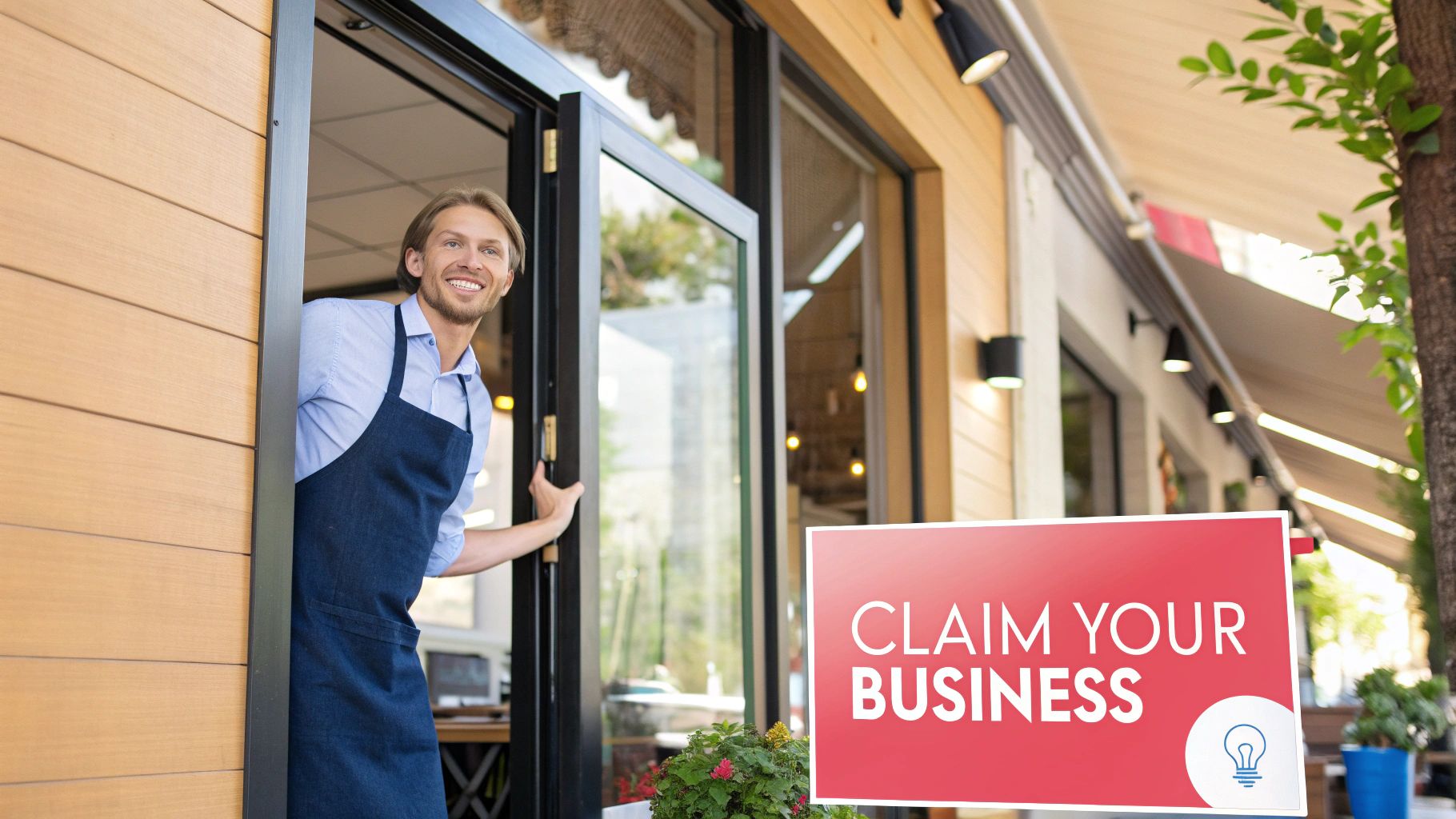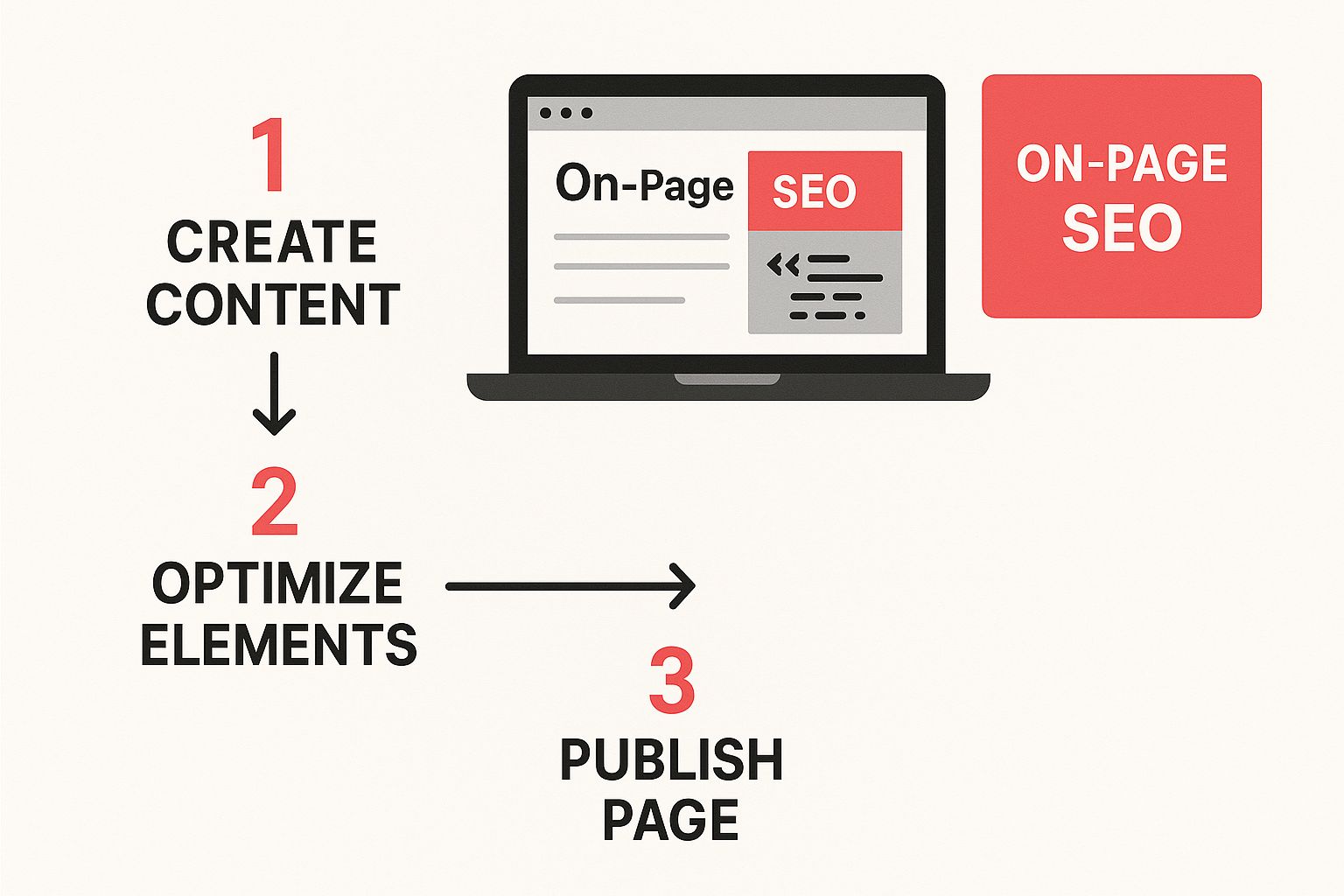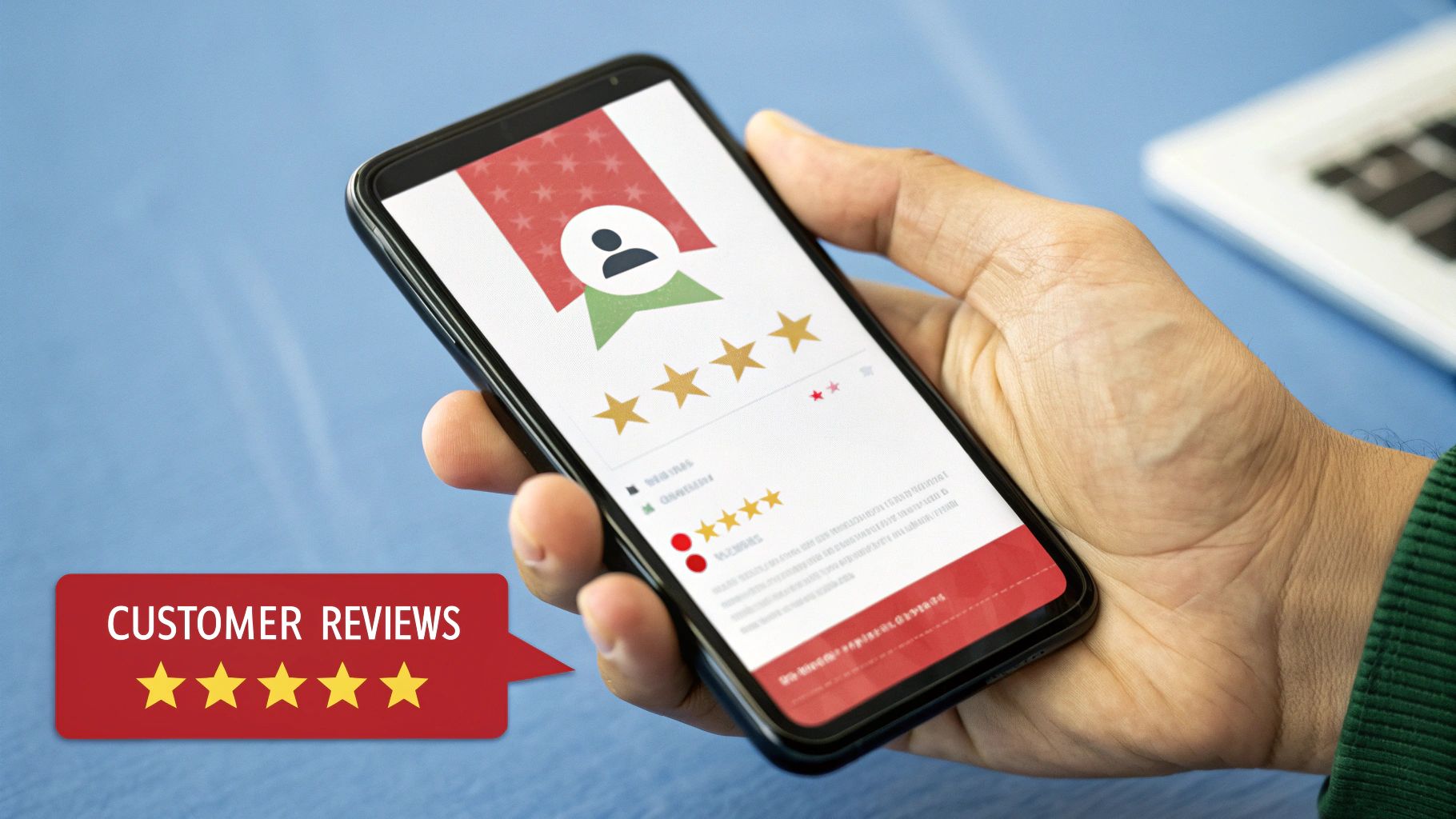Local SEO Small Business: Boost Your Success Today
Trying to compete with the big national chains can feel like a losing game. But as a small business your biggest advantage is right on your doorstep. Local SEO is the secret weapon for UK businesses, turning simple online searches into customers walking through your door.
This isn't just about showing up online; it’s about being the first and best choice for people in your community who are ready to buy.
Why Local SEO Is Your Biggest Opportunity

Let's be honest, the way customers find businesses has completely changed. The days of thumbing through the Yellow Pages are long gone. Today it’s all about a quick search on Google Maps or asking a smart speaker for the "best coffee near me".
This shift is a massive opportunity.
Imagine your local bakery in York outranking a supermarket giant for "best sourdough in York." Or a plumber in Bristol appearing before a national firm for an "emergency boiler repair." This isn't just a fantasy; it's the real power of a smart local search strategy. It levels the playing field, putting you directly in front of customers the moment they need you.
Turning Clicks Into Customers
The intent behind a local search is incredibly powerful. When someone types in a service followed by "near me," they’re not just browsing—they're ready to act. The data backs this up.
Recent figures show that around 98% of UK consumers use the internet to find local businesses. Even better, 76% of people who search for something local on their phone visit a business within 24 hours. And of those visits, 28% turn into a sale. That's a straight line from search to revenue.
Your business doesn't just need to be online. It needs to be visible in the exact moments a local customer is searching for what you offer. Local SEO makes that happen.
The Core Benefits For Your Business
For a small business, focusing on local search offers clear, tangible advantages that go way beyond just appearing on a map.
- Increased Visibility: You get in front of a highly relevant local audience that’s actively looking for your products or services.
- Higher Footfall: A well-optimised local presence drives real people to your physical location, whether it's a shop, café or office.
- Enhanced Trust: A strong local profile, complete with positive reviews and consistent information, builds instant credibility with potential customers.
- Competitive Edge: It helps you stand up against larger, non-local competitors who can't match your community connection.
By focusing on your immediate area, you stop trying to be everything to everyone and start becoming the go-to expert for your local community. For a deeper look at getting this set up, check out this guide on how to do local SEO for small businesses.
Building Your Foundational Local Presence
Now that we've covered the 'why', it's time to roll up our sleeves and get practical. Building a solid local presence online isn’t about some dark art of SEO; it’s about getting the fundamentals right from the very beginning.
Think of it like setting up your physical shop front. It needs to be clean, accurate, inviting and easy for people to find.
The absolute cornerstone of this foundation is your Google Business Profile (GBP) . This free listing is often the very first interaction a potential customer has with your business. For many, it's what they see before they even think about clicking through to your website. Getting this right isn't a one-off job; it's an ongoing process that directly impacts how you show up in local searches and on Google Maps.
Optimising Your Google Business Profile
A complete and active profile sends a strong signal to Google that you're a legitimate, trustworthy business. More importantly, it's your chance to control the story and present your business in the best possible light.
Let's take a real-world example. Imagine a small, independent coffee shop in Bristol called 'The Bristol Bean'. They want to pull in local office workers and tourists searching for things like "best coffee near Bristol Temple Meads." Their first, most crucial step is a perfectly optimised GBP.
Here’s what that looks like:
-
Business Categories: This is more important than most people realise. 'The Bristol Bean' must select 'Coffee Shop' as their primary category. But they shouldn't stop there. Adding secondary categories like 'Café', 'Espresso Bar' and 'Sandwich Shop' helps them appear for a much wider range of searches. Being too vague or getting this wrong will just confuse Google and your potential customers.
-
Business Description: This is your elevator pitch. Instead of a flat "We sell coffee," The Bristol Bean should write something with a bit of personality: "Artisan coffee shop in the heart of Bristol, serving locally roasted single-origin beans, handmade cakes and fresh sandwiches. The perfect spot for your morning caffeine fix or a relaxed lunch." Notice how it includes keywords ('artisan coffee', 'locally roasted', 'Bristol') and actually tells people what to expect.
-
Engage with Posts and Q&A: The Posts feature is essentially a mini-blog for your profile. 'The Bristol Bean' could use it to announce a "new guest espresso" or a "lunch deal for two". The Q&A section is another goldmine. If customers often ask, "Do you have vegan options?", the owner can proactively add this question and answer it themselves. It's about removing friction and giving people the information they need, right away.
This short video explains how optimising these on-page elements, including your Google Business Profile, creates a cohesive local SEO strategy.

The image drives home the point that on-page SEO isn't just about your website. It extends to every single digital asset that represents your local business.
The Bedrock of Local SEO: NAP Consistency
Now we get to the absolute bedrock of local SEO: NAP consistency .
NAP stands for Name, Address and Phone number . It sounds deceptively simple but making sure these three pieces of information are identical everywhere they appear online is fundamentally important.
Think about it this way: if you gave one friend your new address but gave a slightly different version to another, it would cause confusion. It's the same for Google. Inconsistencies in your core business data create doubt and erode its trust in your business, which can directly harm your rankings.
Every single mention of your business online—from a major directory like Yell.com to a tiny local blog feature—is called a 'citation'. Google pieces these citations together to verify who you are and where you are. When they all match perfectly, it builds a powerful, consistent signal of your legitimacy.
For our coffee shop, 'The Bristol Bean', this means being meticulous:
- Name: The Bristol Bean (Not 'The Bristol Bean Cafe' or 'Bristol Bean')
- Address: 123 High Street, Bristol, BS1 1AA (Not '123 High St.' or 'Bristol, BS11AA')
- Phone: 0117 496 0123 (Not '+44 117 496 0123' or '01174960123')
Yes, it really needs to be that precise. Even a tiny variation can look like a completely different business to a search engine.
Securing Key UK Business Citations
Once you have your NAP details locked down, the next job is to get them listed correctly across the UK's most important business directories. Think of these as the modern Yellow Pages—highly trusted information sources for Google.
Getting your business listed accurately here is a massive step forward. As you start building out your online footprint, you can learn more about how to boost your business SEO with local listings and really maximise your impact.
To begin, you need to focus your energy on the platforms that carry the most authority in the UK. Getting these right provides a solid base you can build on later.
Essential UK Citation Sources for Small Businesses
This table outlines the key online directories and platforms where UK businesses should focus their efforts first. Ensuring your NAP information is listed accurately and consistently here is non-negotiable for building a strong local SEO foundation.
| Directory/Platform | Type | Key Benefit |
|---|---|---|
| Google Business Profile | Search Engine | The most critical listing for visibility in local search and Maps. |
| Bing Places for Business | Search Engine | The equivalent of GBP for the Bing search engine, capturing a different segment of users. |
| Yell.com | General Directory | A long-standing and highly trusted UK business directory. |
| Thomson Local | General Directory | Another authoritative and well-established directory for UK businesses. |
| Social Media | Your business page's 'About' section acts as a powerful citation source. | |
| TripAdvisor | Niche Directory | Essential for hospitality businesses like restaurants, hotels and attractions. |
| Trustpilot | Review Platform | A major review site that also functions as a trusted business citation. |
By meticulously setting up your Google Business Profile and then ensuring your NAP is perfectly consistent across these key UK directories, you're building a powerful and trustworthy foundation.
This is the essential first move in helping local customers find you, trust you and ultimately choose you over the competition.
Creating Website Content That Ranks Locally

While your Google Business Profile acts as your digital shop window, your website is your home base. It’s the one online asset you truly own and control and when you get it right, it’s a seriously powerful tool for pulling in local customers. This is where you graduate from simply being listed to proving your local expertise to both people and search engines.
The aim is to transform your website into a magnet for people in your area searching for exactly what you provide. This means speaking their language, using the phrases they actually type into Google and structuring your site to scream local relevance.
Finding What Local Customers Search For
Before you write a single word, you need to get inside the heads of your potential customers and figure out the exact phrases they’re using. Generic keywords just won’t cut it. You need to uncover those geographically-specific terms that signal someone is ready to buy.
Think about the difference. A search for "plumber" could be from anyone, anywhere. But a search for "emergency plumber in Manchester"? That’s someone with an urgent, specific problem you can solve. Your job is to find these golden-ticket local keywords.
You can start with some simple brainstorming. Just think about the services you offer and the towns or neighbourhoods you serve.
- Service + Location: "Best Sunday roast in Harrogate"
- "Near Me" Modifiers: "MOT centre near me"
- Qualifier + Service + Location: "Affordable family law solicitors in Leeds"
These phrases are the absolute bedrock of your on-site local SEO strategy.
Weaving Keywords Into Your Website
Once you’ve got a solid list of local keywords, the next job is to work them naturally into your website’s content and structure. This isn't about clumsy "keyword stuffing" or forcing phrases where they don’t belong. It’s about using them to create content that’s genuinely clear and helpful.
Concentrate on getting your main local keywords into these key spots:
- Page Titles (Title Tags): This is the big one—it's the title that shows up in the browser tab and on the Google search results page. A good example would be "Emergency Plumber in Manchester | 24/7 Call Out Service".
- Headings (H1, H2, H3): Your main page heading (H1) needs to clearly state what the page is about, using your target phrase. Then use subheadings (H2, H3) to target related or secondary keywords.
- Page Content: The body text of your pages should include your keywords and related variations in a way that sounds completely natural. Always write for your customers first; the search engines will catch on.
By placing these terms strategically, you’re sending crystal-clear signals to Google about what each page is about and where it's relevant.
The most powerful move a local small business can make on its website is to stop thinking of itself as one business serving one area. Instead think of it as a collection of specialised services, each deserving its own dedicated focus for every key location it serves.
The Power of Location-Specific Pages
This brings us to what is arguably the most effective on-site strategy for local SEO: creating dedicated pages for each service in each location you cover. This tactic allows you to be incredibly specific and relevant, which is exactly what Google wants to show its users.
Let's take a law firm based in Leeds that also serves clients in nearby Harrogate. A generic "Services" page is a massive missed opportunity. A far smarter approach is to build out specific, targeted pages.
Instead of one vague page, they could create:
- A page for 'Family Law Solicitors in Leeds'
- Another page for 'Conveyancing Services in Leeds'
- A separate page for 'Family Law Solicitors in Harrogate'
- And another for 'Conveyancing Services in Harrogate'
Each of these pages can be meticulously optimised for its specific keyword combination. The content on the 'Harrogate' page can mention local landmarks, directions from the town centre or even case studies involving clients from that area.
This makes the page hyper-relevant to someone in Harrogate searching for conveyancing help. It’s this level of detail that builds immense authority and trust. It tells Google you’re not just located near Harrogate; you are an active expert serving Harrogate. This is how you capture highly motivated customers and start to dominate the local search results.
For a broader understanding of how this fits into a complete strategy, you might be interested in our guide on SEO , which covers the bigger picture. This focused approach is a fundamental part of a successful local SEO small business plan.
Building Local Trust with Reviews and Links
Once your foundations are solid and your website content is in good shape, it’s time to focus on building trust. In the world of local SEO, trust is a currency you earn in two key ways: what your customers say about you (reviews) and what other local businesses and organisations say about you (links).
Think of these as powerful social proof. They signal to both search engines and potential customers that your business is a legitimate, respected and active part of the local community. It’s what separates the established players from the newcomers.
Encouraging and Managing Customer Reviews
Online reviews are the new word-of-mouth. There’s no escaping it. A steady stream of positive feedback on your Google Business Profile is one of the most powerful ranking factors for local search. It proves you deliver on your promises and that real people are happy with your service.
The trick is to make leaving a review as simple as possible for a happy customer. You shouldn't be pushy but you absolutely should be gently encouraging feedback.
- Make the Ask Personal: The best time to ask is right after a positive interaction. A plumber could ask a happy customer in person after a successful job. A café could include a small note with a QR code on the receipt. It feels natural.
- Use Simple Email Templates: A quick follow-up email is a brilliant, low-effort way to request a review. Keep it short, sweet and provide a direct link to your Google review page to remove any hassle.
- Add a Link to Your Website: Make it easy for people to find where to leave feedback. Add a prominent "Review Us on Google" button somewhere obvious on your site.
Managing reviews is an ongoing task. You can learn more about how to get the most from your profile with our guide to getting more business from your Google Business Profile.
Responding to every single review, good or bad, is non-negotiable. A thoughtful response to a negative review can often be more powerful than a string of five-star ratings, as it showcases your commitment to excellent customer service for everyone to see.
Turning a negative comment into a positive is a real skill. Always thank the reviewer for their feedback, acknowledge their issue without getting defensive and offer to resolve the problem offline. This public display of professionalism builds enormous trust.
Demystifying Local Link Building
The term 'link building' often sounds complicated and technical but for a local business, it's far simpler than you think. A link from another website to yours is like a vote of confidence. When that link comes from a respected, local website, it’s a powerful signal to Google that you’re a key player in the community.
Forget the complex SEO jargon for a moment and think about real-world relationships. Local link building is often just a digital side-effect of your offline community involvement. It’s about building genuine connections that happen to have a digital benefit.
Consider these practical scenarios:
- Sponsor a Local Event: If you sponsor the local village fete or a youth football team, they will almost certainly have a website. Just ask them to add a link to your website on their 'Sponsors' page. It’s natural, relevant and a highly valuable local link.
- Host a Community Workshop: A local bookshop could host a children's story time. A hardware shop could run a DIY workshop. Promote the event to local community groups and bloggers who will likely write about it and link back to your site.
- Partner with Neighbouring Businesses: Team up with a non-competing business nearby for a joint promotion. A florist and a chocolatier, for instance, could offer a combined Valentine's Day package and cross-promote each other on their websites with links.
These activities build genuine local authority that search engines love to see. And it's worth the effort. Research shows that nearly 96% of consumers find local businesses through online searches. Responding to reviews and building local links is what helps you stand out.
For a deeper dive into the technical side, understanding what backlinks are and why they matter for SEO is crucial for building your online authority beyond your immediate neighbourhood.
Measuring Your Local SEO Success
So, you’ve put in the time and effort on your local SEO. Now for the big question: is it actually working? The goal here isn’t to get lost in a sea of spreadsheets. It’s about focusing on a few key metrics that prove you’re getting real-world results.
Using free tools like Google Analytics 4 and Google Search Console , you can draw a straight line from your online activity to your business goals. This is about swapping guesswork for informed decisions, making sure every move you make is genuinely delivering value.
What to Look for in Google Search Console
Think of Google Search Console (GSC) as your direct line to Google. It tells you exactly how your website is performing in search results, focusing on clicks, impressions and your average ranking position. It’s the perfect place to start.
The real magic happens when you filter your performance report to see queries that include your location names, like 'Bristol' or 'Manchester'. This simple trick shows you how many people are seeing your site for local searches and, crucially, how many are clicking through. Keep an eye on this data over time; if the numbers are climbing, you’ll know your local keyword strategy is hitting the mark.
Digging into Your Location Pages with Google Analytics 4
While GSC shows you what happens before someone clicks on your site, Google Analytics 4 (GA4) reveals what they do after they land. This is where you can see which of your location-specific pages are actually doing the heavy lifting.
Head over to the 'Pages and screens' report in GA4. You should see your location pages—something like 'family-law-solicitors-in-leeds'—pulling in traffic. If these pages also have high engagement rates and are leading to conversions (like a contact form submission), that’s a clear sign your content is connecting with the right local audience.
The most crucial part of measuring local SEO success is connecting online metrics to offline actions. A rise in website clicks is great but a rise in phone calls or shop visits is what truly matters for a small business.
Uncovering Real-World Actions with GBP Insights
Your Google Business Profile (GBP) Insights are where the digital world meets the physical one. This is the ultimate proof that your efforts are driving tangible outcomes.
GBP Insights gives you the data on specific, high-value customer interactions. These are the actions that directly lead to new business and are absolutely essential for tracking your return on investment. You'll see things like:
- Clicks to Call: How many potential customers rang you straight from your listing.
- Direction Requests: The number of people who asked Google Maps to guide them to your front door.
- Website Clicks: How many users clicked through to your site from your profile.
This isn't just vanity data; it's a direct measure of intent.
To help you keep things straight, this table breaks down the most important local SEO metrics, what they signify and the primary tool you'll use to find them.
Key Local SEO Metrics and Where to Find Them
| Metric | What It Tells You | Tool to Use |
|---|---|---|
| Local Keyword Rankings | Your visibility for important search terms in your specific area. | Google Search Console |
| GBP Clicks for Directions | How many people requested directions to your physical location. | Google Business Profile Insights |
| GBP Clicks to Call | The number of potential customers who called your business directly from your listing. | Google Business Profile Insights |
| Organic Traffic to Location Pages | How much search traffic your specific service and location pages are attracting. | Google Analytics 4 |
| Local Search Impressions | The total number of times your business appeared in local search results. | Google Search Console |
By regularly checking these key metrics, you get a clear, straightforward picture of your local SEO performance. It’s not about tracking every single number. It’s about focusing on the ones that demonstrate growth in local visibility and, most importantly, in customer actions. This is how you make smarter decisions and continue to refine your strategy for success.
Common Questions We Hear About Local SEO
Getting into local SEO always brings up a few questions. It’s completely normal. Let’s clear up some of the most common ones we get asked, so you can move forward with confidence and put your energy where it’ll make a real difference.
How Long Does It Take to See Results from Local SEO?
This is the big one and the honest answer is it’s a marathon, not a sprint. Results are cumulative. You'll likely see some early wins within a few weeks, especially on your Google Business Profile. Things like a jump in phone calls or more people asking for directions are great signs that you're on the right track.
But for the really competitive stuff—think ranking number one for ‘plumber in Leeds’—you need to be patient. It generally takes a solid three to six months of consistent work to climb the rankings and stay there. It’s all about building momentum over time, not finding a magic overnight fix.
Can I Do Local SEO Myself, or Should I Hire Someone?
Absolutely. Many small business owners can nail the fundamentals of local SEO on their own, especially by following a guide like this one.
Things like optimising your Google Business Profile, encouraging customer reviews and making sure your business details are consistent online are very manageable tasks. However, if you’re in a cut-throat market or just don’t have the hours to spare, bringing in a specialist can seriously speed things up and give you access to a deeper level of expertise.
The biggest mistake we see is treating local SEO as a one-and-done task. Your Google Business Profile isn’t a static phone book entry; it’s a living, breathing part of your business, much like a social media profile. It needs regular attention.
What’s the Biggest Mistake Small Businesses Make?
By far, the most damaging mistake is inconsistent business details . Even slight differences in your business name, address and phone number (NAP) across various online directories can confuse search engines. This erodes the trust Google has in your business, which directly hurts your ability to rank.
Another huge error is setting up a Google Business Profile and then forgetting about it. A successful local SEO small business strategy requires constant engagement. You need to be adding new photos, creating posts about offers and responding to every single customer question and review. This consistent activity signals to Google that you’re an active, reliable local business that deserves to be shown to people searching in your area.
Ready to turn local searches into loyal customers? The team at Superhub specialises in creating bespoke local SEO strategies that drive real growth for businesses across the UK. Get in touch with us today to see how we can boost your local visibility.
Want This Done For You?
SuperHub helps UK brands with video, content, SEO and social media that actually drives revenue. No vanity metrics. No bullshit.



